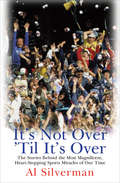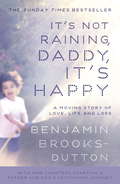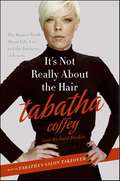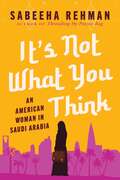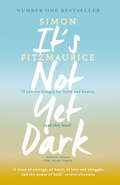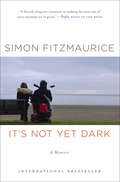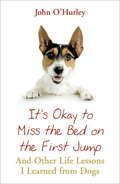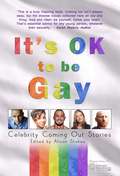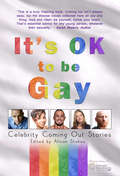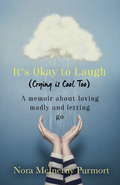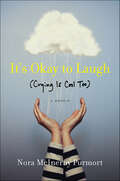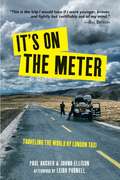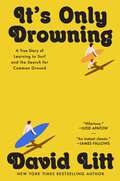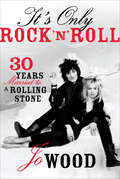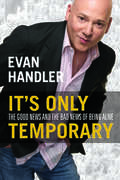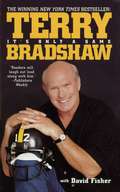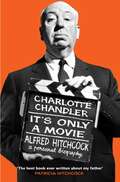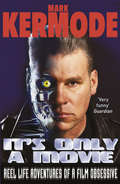- Table View
- List View
It's Not Over 'Til It's Over: The Stories Behind Most Magnificent Heart-Stopping Sports Miracles of Our Time
by Al SilvermanFind inspiration in these &“enjoyable&” accounts of historic last-minute victories—both legendary and little-known—in the world of sports (Booklist). From a former editor of Sport magazine, this book is a journey through a century of athletic endeavor, from baseball to boxing and beyond—filled with true stories that remind us of some of the qualities that can help to create a champion: perseverance, determination, and hope. &“Re-creations of 13 dramatic sports events from the 20th century . . . While Silverman has chosen to profile a handful of well-documented events, such as New York Giant Bobby Thompson&’s 1951 home run at the Polo Grounds, the first Ali-Frazier prizefight in 1971 and the 1980 US hockey team&’s Olympic victory over the Russians, the real value of the book lies in his depiction of such obscure or neglected events as the 1923 boxing match between Argentine Luis Firpo and American Jack Dempsey, and the 1968 Harvard-Yale football game . . . The best piece follows an unknown Native American Marine from Kansas who shocked himself and the world by winning the 10,000-meter road race at the 1964 Tokyo Olympics . . . He often tracks down and interviews event participants to provide perspective from both the victor and the vanquished.&” —Publishers Weekly
It's Not Raining, Daddy, It's Happy
by Benjamin Brooks-DuttonBen Brooks-Dutton's wife - the great love of his life - was knocked down and killed by a car as he walked beside her, pushing their two-year-old son in his buggy. Life changed forever. Suddenly Ben was a widower deep in shock, left to raise their bewildered child alone. In the aftermath Ben searched for guidance from men in similar situations, but it appeared that young widowed fathers don't talk. Well-meaning loved ones admired his strength. The unwritten rule seemed to be to 'shut up, man up and hide your pain'. Lost, broken and afraid of the future, two months after his wife Desreen's death, Ben started a blog with the aim of rejecting outdated conventions of grief and instead opening up about his experiences. Within months Life as a Widower, had received a million hits and had started an all-too-often hushed conversation about the reality of loss and grief. This is the story of a man and a child who lost the woman they so dearly love and what happened in the year that followed. Ben describes the conflicting emotions that come from facing grief head on. He rages against the clich?s used around loss and shows the strange and cruel ways in which grief can take hold. He also charts what it means to become a sole parent to a child who has lost their mother and cannot yet understand the meaning of death. Through the shock and sadness shine moments of hope and insight. So much of what Ben learns comes from watching his son struggle, survive and live, as children do, from moment to moment where hurt can turn to happiness and anger can turn to joy. This is a story of loss, heartbreak and courage. At its heart is the funny, infuriating and life affirming relationship between a father and son and their ongoing love for an extraordinary woman.
It's Not Really About the Hair: The Honest Truth About Life, Love, and the Business of Beauty
by Richard Buskin Tabatha CoffeyFans of the hit Bravo show Tabatha's Salon Takeover tune in for the straight-shooting, unvarnished commentary of its ballsy, stylish, and savvy star. Though millions admire Tabatha Coffey's unflinching honesty and never-say-die attitude, some do not and have even taken to name-calling. Refusing to let others define her, she has reclaimed the word "bitch," transforming it to fit the person she is: Brave, Intelligent, Tenacious, Creative, and Honest. In It's Not Really About the Hair, this deeply private woman shares the experiences of her own life to encourage you to get in touch with your own inner bitch. Tabatha reveals how she used her strength and openness to help define her signature look, personal relationships, life choices, and tenacious work ethic—one that in her own words likens her to "a pit bull with a bone." Here are the people and the circumstances that have led her to a place of honesty, self-assurance, satisfaction, and success—from her tough-minded mum to her famous mentors, her peers, and clients.Part memoir, part business manual, and part coaching guide on achieving self-acceptance and love, It's Not Really About the Hair teaches you that it's all right to be who you are, stand up for what you believe in, and do what makes you happy without being defined by others.Tabatha Coffey's raw, funny, shocking, and always inspirational story will encourage you to celebrate the long-lasting and most important beauty of all—the true beauty that is you.
It's Not What You Think: An American Woman in Saudi Arabia
by Sabeeha RehmanFrom the author of Threading My Prayer Rug, an eye-opening view of life in Saudi Arabia.It&’s Not What You Think is a wry, incisive account of working in Saudi Arabia that offers insight into that insular patriarchal society, what is so attractive to expatriates living there, and what was contradictory or confining about it for a naturalized American who is a woman and a Muslim. A hospital executive in New Jersey, Sabeeha relocated with her oncologist husband to Riyadh, the most conservative city in the country, intending to remain two years. They ended up staying for six. Her book takes the reader on a journey of discovery that mirrors her own. Offered an influential position at Riyadh&’s most prestigious hospital, she first has to obtain her husband&’s permission to work. In public spaces, she quickly encounters the morality police but also learns the freedom of the abaya. Salesmen staff the lingerie department. Women in Riyadh do not work in public places, yet they hold positions of authority within corporate culture; and outside Riyadh, she discovers that women-owned-and-operated businesses flourish, and Bedouin women could drive in the desert decades before Riyadh&’s ban was relaxed. Through Sabeeha&’s eyes, we see how Saudi and Western expat cultures coexist within the boundaries of &“don&’t ask, don&’t tell,&” how traditions define the identity of the Saudi nation, and how to discern what is &“culturally appropriate&” versus what is required legally. As she dons pilgrim&’s garb, we join her on the hajj, to discover the intensity and spiritual high of the devout.
It's Not Yet Dark
by Simon Fitzmaurice'If you are hungry for truth and beauty, read this book' Roisin Ingle, The Irish Times'A demonstration of a will to live that is breathtaking ... a work of documentary poetry ... an extraordinary read' The Herald'An unforgettable read about what it means to be alive' Woman's Way'The world "inspirational" is over-used, but if ever a book deserved this epithet, this is it' Sunday Independent'Sparsely and beautifully written .. the human spirit and will to live shines out of these pages' Irish IndependentA No.1 bestseller, It's Not Yet Dark is an unforgettable book about relationships and family, about what connects and separates us as people and, ultimately, about what it means to be alive.In 2008, Simon Fitzmaurice was diagnosed with Motor Neurone Disease (mnd). He was given four years to live. In 2010, in a state of lung-function collapse, Simon knew with crystal clarity that now was not his time to die. Against all prevailing medical opinion, he chose to ventilate in order to stay alive.Here, the young filmmaker, a husband and father of five small children draws us deeply into his inner world. Written using an eye-gaze computer and told in simply expressed and beautifully stark prose, the result is an astonishing journey into a life which, though brutally compromised, is lived more fully and in the moment than most, revealing at its core the power of love its most potent.
It's Not Yet Dark
by Simon Fitzmaurice'If you are hungry for truth and beauty, read this book' Roisin Ingle, The Irish Times'A demonstration of a will to live that is breathtaking ... a work of documentary poetry ... an extraordinary read' The Herald'An unforgettable read about what it means to be alive' Woman's Way'The world "inspirational" is over-used, but if ever a book deserved this epithet, this is it' Sunday Independent'Sparsely and beautifully written .. the human spirit and will to live shines out of these pages' Irish IndependentA No.1 bestseller, It's Not Yet Dark is an unforgettable book about relationships and family, about what connects and separates us as people and, ultimately, about what it means to be alive.In 2008, Simon Fitzmaurice was diagnosed with Motor Neurone Disease (mnd). He was given four years to live. In 2010, in a state of lung-function collapse, Simon knew with crystal clarity that now was not his time to die. Against all prevailing medical opinion, he chose to ventilate in order to stay alive.Here, the young filmmaker, a husband and father of five small children draws us deeply into his inner world. Written using an eye-gaze computer and told in simply expressed and beautifully stark prose, the result is an astonishing journey into a life which, though brutally compromised, is lived more fully and in the moment than most, revealing at its core the power of love its most potent.
It's Not Yet Dark: A Memoir
by Simon Fitzmaurice'If you are hungry for truth and beauty, read this book' Roisin Ingle, The Irish Times'A demonstration of a will to live that is breathtaking ... a work of documentary poetry ... an extraordinary read' The Herald'An unforgettable read about what it means to be alive' Woman's Way'The world "inspirational" is over-used, but if ever a book deserved this epithet, this is it' Sunday Independent'Sparsely and beautifully written .. the human spirit and will to live shines out of these pages' Irish IndependentA No.1 bestseller, It's Not Yet Dark is an unforgettable book about relationships and family, about what connects and separates us as people and, ultimately, about what it means to be alive.In 2008, Simon Fitzmaurice was diagnosed with Motor Neurone Disease (mnd). He was given four years to live. In 2010, in a state of lung-function collapse, Simon knew with crystal clarity that now was not his time to die. Against all prevailing medical opinion, he chose to ventilate in order to stay alive.Here, the young filmmaker, a husband and father of five small children draws us deeply into his inner world. Written using an eye-gaze computer and told in simply expressed and beautifully stark prose, the result is an astonishing journey into a life which, though brutally compromised, is lived more fully and in the moment than most, revealing at its core the power of love its most potent.
It's Not Yet Dark: A Memoir
by Simon FitzmauriceAn international bestselling memoir about an Irishman who chose to live life to the fullest after his diagnosis of ALS.In 2008, Simon Fitzmaurice was diagnosed with Lou Gehrig&’s disease. He was given four years to live. In 2010, in a state of lung-function collapse, Simon knew with crystal clarity he was not ready to die. Against all prevailing medical opinion, he chose life. Despite the loss of almost all motor function, thanks to miraculous technology, he continued to work, raise his five children, and write this astonishing memoir. It&’s Not Yet Dark is a journey into a life that, though brutally compromised, was lived more fully than most, revealing the potent power of love, of art, and of the human spirit. Written using an eye-gaze computer, this is an unforgettable book about relationships and family, about what connects and separates us as people, and, ultimately, about what it means to be alive.International Bestseller A Barnes & Noble Discover Pick A Barnes & Noble Best Biography of the Year An iBooks Best Book of the MonthAn Amazon Best Memoir of the Month&“A fiercely eloquent testament to making the most out of every moment we&’re given.&”—People, Book of the Week &“Vibrant.&”—Minneapolis Star Tribune&“Beautifully written. Utterly life-affirming.&”—Alan Rickman &“A beautiful love story—in its essence that's what this is. Survival stories are not about surviving, they're inherently about what makes a survivor push through. A desire to remain in the light of all creation, even as a darkening is taking place. A darkening which happens to us all.&”—Colin Farrell
It's Not as Bad as it Sounds (My Life with MS & Fibro)
by Yvonne DecelisA memoir of a life with MS and fibromyalgia.
It's OK to Miss the Bed on the First Jump
by John O'HurleyCharming and hilarious, IT'S OK TO MISS THE BED ON THE FIRST JUMP is more than a mere celebration of man's best friend. In this lighthearted and reflective exploration of how dogs have served as some of our most valuable and enlightened teachers, well-known and well-loved actor John O'Hurley (Seinfeld, Dancing with the Stars) shares lessons learned from his life with canine companions, including: Every 15 Minutes Is a New Day; When One Person Stops Petting You, Move On; and You're Only as Big as You Think You Are, to name a few. 'Dogs, after all, have pure hearts, trusting natures, a zest for living, noble characters, and an ability to take things in stride,' writes O'Hurley in the book's introduction. 'They can be counted on, and are pleasant companions. They know what's important, always. How many humans do you know about which you could say the same?' Both poignant and laugh-out-loud funny, IT'S OK TO MISS THE BED ON THE FIRST JUMP is an ideal gift for the dog lover in your life.
It's OK to Miss the Bed on the First Jump
by John O'hurleyCharming and hilarious, IT'S OK TO MISS THE BED ON THE FIRST JUMP is more than a mere celebration of man's best friend. In this lighthearted and reflective exploration of how dogs have served as some of our most valuable and enlightened teachers, well-known and well-loved actor John O'Hurley (Seinfeld, Dancing with the Stars) shares lessons learned from his life with canine companions, including: Every 15 Minutes Is a New Day; When One Person Stops Petting You, Move On; and You're Only as Big as You Think You Are, to name a few. 'Dogs, after all, have pure hearts, trusting natures, a zest for living, noble characters, and an ability to take things in stride,' writes O'Hurley in the book's introduction. 'They can be counted on, and are pleasant companions. They know what's important, always. How many humans do you know about which you could say the same?' Both poignant and laugh-out-loud funny, IT'S OK TO MISS THE BED ON THE FIRST JUMP is an ideal gift for the dog lover in your life.
It's OK to be Gay
by Alison StokesA page-turner... a terrific read' Susan Sallis "A powerful tale of survival and hardship, very well crafted and with strong characters" - Publishing News Magda's Daughter - Book Nine of the Hearts of Gold series by Best-Selling author Catrin Collier Stateless and destitute after the Second World War, Magda Janek settles in the Welsh town of Pontypridd, in the hope of building a new life for herself and her baby daughter, Helena. All Magda has to give Helena are the ambitions she had once cherished for herself; dreams cruelly snatched from her by the war and its terrible aftermath. But 1960s Pontypridd is a place of opportunity - at twenty-one, Magda's daughter has beauty, confidence and prospects beyond even her mother's wildest imaginings. With a university degree behind her, a coveted teaching post in her old Grammar school, and marriage to the love of her life, Dr Eddie John, the son of an old Pontypridd family to look forward to, Helena couldn't be happier. Until tragedy strikes. A tragedy that robs Helena of the only family she has ever known and everything she has ever believed in; Helena uncovers a bitter secret, so explosive that her mother carried it to the grave...
It's OK to be Gay: Celebrity Coming Out Stories
by Alison StokesLaunched to coincide with National Coming Out Day, It's OK to be Gay is a collection of inspirational coming out stories from well-known figures from the LGBT community, who talk frankly about their own experiences and how their sexuality has shaped their character and success.Contributors include: Sue Perkins; rugby star Gareth Thomas; best-selling crime writer Val McDermid; Coronation Street star Charlie Condou; Strictly Come Dancing star Robin Windsor; Evan Davis, presenter of Dragon’s Den and Radio 4′s Today programme; Alice Arnold, former BBC newsreader and partner of Clare Balding; Edd Kimber, winner of the first ever Great British Bake Off; Reggae/soul singer Diana King; Lord Waheed Alli, Labour peer and entrepreneur; Award-winning writer Stella Duffy; X Factor finalist Jade Ellis; Author Paul Burston; Paralympian Claire Harvey; Actress Sophie Ward; Jane Czyzselska, editor of Diva magazine; Hip-hop artist Q Boy; Playwright Shelley Silas; Former Brookside actor Stifyn Parri; International rugby referee Nigel Owens; BBC Radio presenter Chris Needs; Rosie Wilby, comedienne and writer; Phyllis Opoku-Gyimah, Director UK Black Pride; Darren Scott, editor of GT magazine;It's OK to be Gay is a raising money for the charity Diversity Role Models and its work to stop homophobic bullying in schools.
It's OK to be Gay: Celebrity Coming Out Stories
by Alison StokesLaunched to coincide with National Coming Out Day, It's OK to be Gay is a collection of inspirational coming out stories from well-known figures from the LGBT community, who talk frankly about their own experiences and how their sexuality has shaped their character and success.Contributors include: Sue Perkins; rugby star Gareth Thomas; best-selling crime writer Val McDermid; Coronation Street star Charlie Condou; Strictly Come Dancing star Robin Windsor; Evan Davis, presenter of Dragon’s Den and Radio 4′s Today programme; Alice Arnold, former BBC newsreader and partner of Clare Balding; Edd Kimber, winner of the first ever Great British Bake Off; Reggae/soul singer Diana King; Lord Waheed Alli, Labour peer and entrepreneur; Award-winning writer Stella Duffy; X Factor finalist Jade Ellis; Author Paul Burston; Paralympian Claire Harvey; Actress Sophie Ward; Jane Czyzselska, editor of Diva magazine; Hip-hop artist Q Boy; Playwright Shelley Silas; Former Brookside actor Stifyn Parri; International rugby referee Nigel Owens; BBC Radio presenter Chris Needs; Rosie Wilby, comedienne and writer; Phyllis Opoku-Gyimah, Director UK Black Pride; Darren Scott, editor of GT magazine;It's OK to be Gay is a raising money for the charity Diversity Role Models and its work to stop homophobic bullying in schools.
It's Okay to Laugh (Crying is Cool Too): A memoir about loving madly and letting go
by Nora McInerny Purmort'Thank you for the perfect blend of nostalgia-drenched humour, wit, and heartbreak, Nora' Mandy Moore'This story will compel you to both laugh and cry, just as the title promises. May we all bring Nora's honesty, passion and hope to our lives' Lena Dunham'It is funny, and it is sad, and it is real, and if you've ever been through anything in your life . . . you are going to love this book' Jennifer Weiner, New York Times Bestselling author of Who Do You Lovecomedy = tragedy + time/roséTwenty-seven-year-old Nora McInerny Purmort bounced from boyfriend to dopey 'boyfriend' until she met Aaron - a charismatic art director and comic-book nerd who once made Nora laugh so hard she pulled a muscle. When Aaron was diagnosed with a rare form of brain cancer, they refused to let it limit their love. They got engaged on Aaron's hospital bed and had a baby boy while he was on chemo. In the period that followed, Nora and Aaron packed fifty years of marriage into the three they got, spending their time on what really matters: Buffy the Vampire Slayer, each other and Beyoncé. A few months later, Aaron died in Nora's arms. The obituary they wrote during Aaron's hospice care revealing his true identity as Spider-Man touched the nation. With It's Okay to Laugh, Nora puts a young, fresh twist on the subjects of mortality and resilience. What does it actually mean to live your 'one wild and precious life' to the fullest? How can a joyful marriage contain more sickness than health? How do you keep going when life kicks you in the junk? In this deeply felt and deeply funny memoir, Nora gives her readers a true gift - permission to struggle, permission to laugh, permission to tell the truth and know that everything will be okay. It's Okay to Laugh is a love letter to life, in all its messy glory; it reads like a conversation with a close friend and leaves a trail of glitter in its wake.
It's Okay to Laugh: (Crying Is Cool Too)
by Nora McInerny Purmort“Thank you for the perfect blend of nostalgia-drenched humor, wit, and heartbreak, Nora.” — Mandy Moorecomedy = tragedy + time/roséTwenty-seven-year-old Nora McInerny Purmort bounced from boyfriend to dopey “boyfriend” until she met Aaron—a charismatic art director and comic-book nerd who once made Nora laugh so hard she pulled a muscle. When Aaron was diagnosed with a rare form of brain cancer, they refused to let it limit their love. They got engaged on Aaron’s hospital bed and had a baby boy while he was on chemo. In the period that followed, Nora and Aaron packed fifty years of marriage into the three they got, spending their time on what really matters: Buffy the Vampire Slayer, each other, and Beyoncé. A few months later, Aaron died in Nora’s arms. The obituary they wrote during Aaron’s hospice care revealing his true identity as Spider-Man touched the nation. With It’s Okay to Laugh, Nora puts a young, fresh twist on the subjects of mortality and resilience. What does it actually mean to live your “one wild and precious life” to the fullest? How can a joyful marriage contain more sickness than health? How do you keep going when life kicks you in the junk? In this deeply felt and deeply funny memoir, Nora gives her readers a true gift—permission to struggle, permission to laugh, permission to tell the truth and know that everything will be okay. It’s Okay to Laugh is a love letter to life, in all its messy glory; it reads like a conversation with a close friend, and leaves a trail of glitter in its wake.This book is for people who have been through some shit.This is for people who aren’t sure if they’re saying or doing the right thing (you’re not, but nobody is). This is for people who had their life turned upside down and just learned to live that way. For people who have laughed at a funeral or cried in a grocery store. This is for everyone who wondered what exactly they’re supposed to be doing with their one wild and precious life. I don’t actually have the answer, but if you find out, will you text me?
It's On the Meter: Traveling the World by London Taxi
by Paul Archer Johno Ellison Leigh PurnellWhen three friends, fueled by an alcohol-induced dream to travel the world, clicked ?buy” on an iconic London cab they name Hannah, little did they know what they were getting themselves into. Leaving the Big Smoke in their vintage taxi, Paul, Johno, and Leigh began a 43,000-mile trip that would take them off the beaten track to some of the most dangerous and deadly places on earth. By the time they arrived home, they would manage, against all the odds, to circumnavigate the globe, and in doing so, break two World Records.It’s On the Meter is an honest account of what it’s like to drive a Black Cab around the world. From altercations with the Iranian Secret Police to narrowly escaping the Taliban, the trio’s adventure is filled with hair-raising escapades. The traveling trio will give an impression of each country the taxi passed through and its people and will help readers understand how to survive fifteen months on the road. Feel the fear, frolic in the fun, and meet the hundred passengers the taxi picked up along the way, as the authors take you on their action-packed journey.
It's Only Drowning: A True Story of Learning to Surf and the Search for Common Ground
by David Litt* A GOODREADS MOST ANTICIPATED BOOK OF SUMMER 2025 * A TOWN & COUNTRY BEST BOOK OF SUMMER 2025 * A former Obama speechwriter moves to the Jersey Shore and learns to surf with the help of his brother-in-law: a tattooed, truck-driving Joe Rogan superfan. David, the Yale-educated writer with a fear of sharks, and Matt, the daredevil electrician with a shed full of surfboards, had never been close. But as America&’s crises piled up and David spiraled into existential dread, he noticed that his brother-in-law was thriving. He began to suspect Matt&’s favorite hobby had something to do with it. David started taking surf lessons. For months, he wiped out on waves the height of daffodils. Yet, after realizing that surfing could change him both in and out of the water, he set an audacious goal: riding a big wave in Hawaii. He searched for an expert he could trust to guide and protect him—and when he couldn&’t find one, he asked Matt. Together, they set out on a journey that spanned coasts, and even continents, before taking them to Oahu&’s famously dangerous North Shore. It&’s Only Drowning is a laugh-out-loud love letter to surfing—and so much more. It&’s an ode to embarking on adventures at any age. It&’s a blueprint for becoming braver at a time when it takes courage just to read the news. Most of all, it&’s the story of an unlikely friendship, one that crosses the fault lines of education, ideology, and culture tearing so many of us apart.
It's Only Rock 'n' Roll: Thirty Years Married to a Rolling Stone
by Jo WoodIn this wild, behind-the-scenes portrait of one of the biggest rock bands in history, Jo Wood comes clean about her three decades as the girlfriend and eventually the wife of Rolling Stones guitarist Ronnie Wood. This startlingly honest, laugh-out-loud memoir vividly describes life on tour, in the studio, at the legendary parties—and every raucous moment in between. From teenage model to hard-partying rock 'n' roll devotee, through motherhood, marriage, breakdown, and the challenge of starting over again, Jo Wood has had a roller-coaster ride of a life. At the age of sixteen, Jo burst onto the British modeling scene and became a fixture at London's most glamorous parties. A few years later, just twenty-two years old and a single mom, she met Ronnie Wood and her life changed forever. Holding nothing back, Jo paints an astonishing picture of the sex, drugs, booze, groupies, and—above all—the fun that filled her thirty years as a member of the Stones' inner circle. Telling never-before-heard stories about what life on the road with the Stones was really like, she offers intimate portraits of the band's legendary cast of characters, including Mick Jagger, Keith Richards, Jerry Hall, and Patti Hansen. She recalls the excitement of getting to know international A-list celebrities like Kate Moss, Andy Warhol, Johnny Depp, and Slash. Jo also opens up about her family life with Ronnie: their passionate love affair, the demands of being a mother by day and a wild child by night, and eventually coping with Ronnie's increasingly difficult behavior as his addictions consumed him. For the first time, she reveals her heartbreaking account of what happened when Ronnie left her for an eighteen-year-old waitress, explaining how she was able to forgive, live without bitterness or regret, and find new happiness as an entrepreneur and organic beauty expert. Including never-before-seen photographs from Jo's personal collection, It's Only Rock 'n' Roll is a compelling piece of rock 'n' roll history from a woman with a backstage pass and front-row seat. Enchanting, candid, and moving, this page-turning fairy tale of fame and fortune has the best of the era's many euphoric and reckless moments within its pages.
It's Only Temporary
by Evan HandlerWhat if you were supposed to die, but you didn't? And what if, years later, your precious second chance didn't turn out anything like you thought it would? That's the journey Evan Handler experiences, and the one he explores in It's Only Temporary: The Good News and the Bad News of Being Alive. In a collection of funny, offbeat, and poignant autobiographical essays, Handler moves beyond the supposedly "incurable" illness he triumphed over in his mid-twenties--only to tumble through his thirties and forties in search of ever elusive love and happiness.From bold attempts to rekindle his acting career to hapless efforts to run faster around New York's Central Park reservoir, from bizarre Internet dates to twenty-seven breakups (involving only ten women), Handler careens through his against-all-odds existence. Always searching for meaning in his unlikely survival, he shares stories of sadistic junior high school gym teachers, bullying wannabe Hollywood moguls, returned engagement rings, and Europeans' fascination with American bathroom habits.Picking up ten years after his first book, Time on Fire, Handler again uses what the New York Times calls his "laceratingly funny and revealing" storytelling skills to weave twenty-one new tales into a defiantly unconventional memoir. Consistently witty and insightful, Handler's stories shift effortlessly from the comedic to the profound, musing with equal intensity on the existence of God and his experiences with TV stardom. Then, just when it seems he's failed to make the most of his astonishing second chance, Handler finds his way to miracles even greater than the ones that saved his life. His memoir describes his journey from darkness to light, from yearning to gratitude, and in so doing succeeds as both a stirring love story and a classic coming-of-age tale. It's Only Temporary celebrates the transformation of a boy to man--even if it look Handler more than forty years to get there.
It's Only a Game
by David Fisher Terry BradshawThis is the absolutely guaranteed 100% mostly true story of Terry Bradshaw: the man who gained sports immortality as the first quarterback to win four Super Bowls -- and the man who later became America's most popular sports broadcaster. IT'S ONLY A GAME "I had a real job once," begins a memoir as honest, unexpected, and downright hysterical as Bradshaw himself. From his humble beginnings in Shreveport, Louisiana, to his success as the centerpiece of the highest-rated football studio show in television history, Terry has always understood the importance of hard work. A veritable jack-of-all-trades, he has probably held more jobs than any other football Hall of Famer ever: pipeline worker, youth minister, professional singer, actor, television and radio talk show host, and now one of the nation's most popular speakers. But let's not forget one of the reasons why so many people know and love Terry Bradshaw: he won four Super Bowls! In It's Only A Game, Terry brings the reader right into the huddle and describes the game from the bottom of a two-ton pile to the top of the sports world. You'll sit right on the fifty-yard line and watch as Terry earns the title world's greatest benchwarmer. And you'll also hear about the single greatest play in pro football -- the Immaculate Reception -- as he never saw it. It's Only A Game is much more than a collection of Terry Bradshaw's favorite and funniest stories, it is the personal account of a great man's search for life before and after football...as only Terry could tell it.
It's Only a Game
by David Fisher Terry BradshawThis is the absolutely guaranteed 100% mostly true story of Terry Bradshaw: the man who gained sports immortality as the first quarterback to win four Super Bowls -- and the man who later became America's most popular sports broadcaster. IT'S ONLY A GAME "I had a real job once," begins a memoir as honest, unexpected, and downright hysterical as Bradshaw himself. From his humble beginnings in Shreveport, Louisiana, to his success as the centerpiece of the highest-rated football studio show in television history, Terry has always understood the importance of hard work. A veritable jack-of-all-trades, he has probably held more jobs than any other football Hall of Famer ever: pipeline worker, youth minister, professional singer, actor, television and radio talk show host, and now one of the nation's most popular speakers. But let's not forget one of the reasons why so many people know and love Terry Bradshaw: he won four Super Bowls! In It's Only A Game, Terry brings the reader right into the huddle and describes the game from the bottom of a two-ton pile to the top of the sports world. You'll sit right on the fifty-yard line and watch as Terry earns the title world's greatest benchwarmer. And you'll also hear about the single greatest play in pro football -- the Immaculate Reception -- as he never saw it. It's Only A Game is much more than a collection of Terry Bradshaw's favorite and funniest stories, it is the personal account of a great man's search for life before and after football...as only Terry could tell it.
It's Only a Mountain: Dick and Rick Hoyt, Men of Iron
by Samuel E. NallIn Dick Hoyt's world the only difference between and hill and mountain is something called attitude, and along with their courage and determination, the Hoyt family has conquered many mountains the past forty years, literally and figuratively. They were devastated when their first son was born with cerebral palsy, a non-vocal quadriplegic but they accepted the challenge. Rather than put Rick in an institution and forget him - as was suggested by the doctors - they gave him a life unlike any other. ESPN, ABC, and NBC brought national attention to Team Hoyt when they conquered the Ironman Hawaii and again they traversed the Rocky Mountains on a bicycle. Dick a novice swimmer tethers himself to a rubber dinghy and tows his adult son 2.4 miles in the Pacific Ocean. He straps Rick to a seat on the front of a custom built bicycle and pedals 112 miles. Together they then complete the Ironman events by running a marathon 26.2 miles, with Rick seated in a running chair. 'These are tremendous accomplishments, of course, but they represent only couple of the rungs in Team Hoyt's inspirational ladder. If you are expecting a simple sports biography, or only a story about a man competing in triathlons and marathons, you are in for a pleasant surprise. That is not what you will din between the covers of this book. Instead, prepare for and emotional saga about the tremendous accomplishments of a handicapped person surrounded by a family motivated by love for one another and for humanity in general!
It's Only a Movie: Alfred Hitchcock, a Personal Biography
by Charlotte ChandlerIn his films, Alfred Hitchcock found the perfect expression for his fantasies, and he shared those fantasies with the world in such classics asThe 39 Steps, The Lady Vanishes, Rebecca, Shadow of a Doubt, Notorious, Strangers on a Train, Rear Window, Long Synopsis: In his films, Alfred Hitchcock found the perfect expression for his fantasies, and he shared those fantasies with the world in such classics asThe 39 Steps, The Lady Vanishes, Rebecca, Shadow of a Doubt, Notorious, Strangers on a Train, Rear Window, The Man Who Knew Too Much, To Catch a Thief, North by Northwest, Vertigo, Psycho,andThe Birds. In It's Only a Movie, Charlotte Chandler draws from her extensive conversations with Hitchcock, frequently revealing unknown facts and unexpected insights into the man, the director, and his films. Author of acclaimed biographies of Groucho Marx, Federico Fellini, and Billy Wilder, Charlotte Chandler spent several years with Hitchcock discussing his life and his amazing career. She also talked with his wife, Alma, and daughter, Pat, as well as many of the screen legends who appeared in his films, including Cary Grant, Ingrid Bergman, James Stewart, Grace Kelly, Joan Fontaine, Laurence Olivier, Michael Redgrave, John Gielgud, Gregory Peck, Henry Fonda, Tippi Hedren, James Mason, Eva Marie Saint, Kim Novak, Anthony Perkins, Janet Leigh, and others. The result is an intimate yet expansive portrait of a unique artist who, from the 1920s through the 1970s, created many of history's most memorable films. A quarter-century after his death, Hitchcock's distinctive profile remains an instantly recognizable icon to millions, while his films continue to grow in popular appeal and critical esteem. Chandler introduces us to the real Hitchcock: a devoted family man, practical joker, and Englishman of Edwardian sensibilities who was one of the great masters of cinematic art.
It's Only a Movie: Reel Life Adventures of a Film Obsessive
by Mark KermodeIn It's Only a Movie, the incomparable Mark Kermode takes us into the weird world of a life lived in widescreen. Join him as he gets lost in Russia on the trail of a low-budget horror flick, gasp as he's shot at in Hollywood while interviewing Bavarian director Werner Herzog, cheer as he gets thrown out of the Cannes film festival for heckling in very bad French, and cringe as he's handbagged by Helen Mirren at London's glitzy BAFTA Awards. Written with sardonic wit and wry good humour, this compelling cinematic memoir is genuinely 'inspired by real events'.
